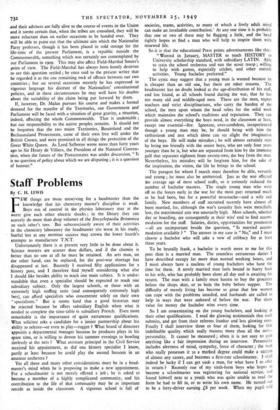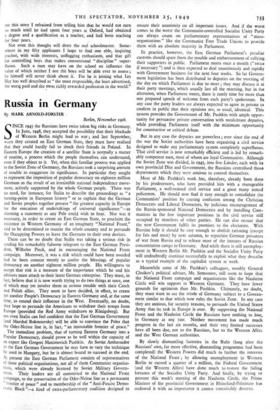Staff Problems
By C. H. LEWIS FEW things are more unnerving for a headmaster than the knowledge that his chemistry master's discipline is weak. Boys out of control in the physics laboratory may at the worst give each other electric shocks ; in the library they can scarcely do more than drop volumes of the Encyclopaedia Britannica on each other's toes. But subconsciously aware of their activities In the chemistry laboratory the headmaster sits tense in his study, fearful lest at any moment success may crown the lower fourth's attempts to manufacture T.N.T.
Unfortunately there is at present very little to be done about it. Science masters arc scarcer than dollars, and if the chemist is better than no one at all he must be retained. An arts man, on the other hand, can be replaced, for the post-war shortage has disappeared at last. Recently I received fifty applications for a history post, and I therefore find myself considering what else I should like besides ability to teach one main subject. It is under- standable that even a specialist should be expected to teach one subsidiary subject. Only the largest schools, or those with an extremely high staffing ratio (and consequently extremely high fees), can afford specialists who concentrate solely on their own '` specialisms." But it seems hard that a good historian may be rejected because he offers subsidiary English when what is needed to complete the time-table is subsidiary French. Even more remarkable is the importance of quite extraneous qualifications. What solicitor asks a candidate for a junior partnership about his ability to referee—or even to play—rugger ? What board of directors appoints a departmental manager because he produces plays in his spare time, or is willing to devote his summer evenings to bowling tirelessly at the nets ? 'What assistant principal in the Civil Service received his appointment, as did one history specialist I know, partly at least because he could play the second bassoon in an amateur orchestra ?
Yet all these and many other considerations must be in a head- master's mind when he is proposing to make a new appointment. For a schoolmaster is not merely offered a job ; he is asked to become a member of a highly complicated community, and his contribution to the life of that community may be as important mitside as inside the classroom. A vigorous school is full of
societies, teams, activities, to many of which a lively adult mind can make an invaluable contribution.' At any one time it is probable that one or two of these may be flagging a little, and the 'head rightly hopes to find a man who will help to inspire them with renewed life.
So it is that the educational Press prints advertisements like this: "Wanted in January, MASTER to teach HISTORY to University scholarship standard, with subsidiary LATIN. Able to train the school orchestra and run the scout troop ; willing to help with games, especially cricket, and other outside activities. Young bachelor preferred."
The cynic may suggest that a young man is wanted because he is cheaper than an old one, but there are other reasons. The headmaster has no doubt looked at the age-distribution of his staff, and has found, as all schools found during the war, that he has too many old and middle-aged men. These are the men, expert teachers and strict disciplinarians, who carry the burden of the school, the men upon whom the head relies for the solid work which maintains the school's traditions and reputation. They can provide almost everything the boys need, in the classroom at least, except one essential—fire. Ignorant, oVer-confident, inexperienced though a young man may be, he should bring with him the enthusiasm and zest which alone can set alight the imagination of the boys. He will make mistakes ; he will almost certainly start by being too friendly with the senior boys, who are only four years younger than he is, but who are separated from him by the immense gulf that separates eighteen from twenty-two, the boy from the man. Nevertheless, his mistakes will be forgiven him, for the sake of the inspiration, the vision, the life he brings to the school.
The paragon for whom I search must therefore be able, versatile and young ; he must also be unmarried. Just as the war affected the average age of most school staffs, so it seriously reduced the number of bachelor masters. The single young man who went off to the forces early in the war for the most part returned much as he had been, but for a powerful moustache—and a wife and family. New members of staff recruited recently have almost all been married, for, although the war's casualty lists were mercifully low, the matrimonial rate was unusually high. Most schools, whether day or boarding, are consequently at their wits' end to find accom- modation for the staff. Salaries, duties, opportunities for promotion —all are unimportant beside the question, "Is married accom- modation available ? " The answer in my case is "No," and I must choose a bachelor who will take a vow of celibacy for at least three years.
To be brutally frank, a bachelor is worth more to me for this post than is a married man. The countless extraneous duties I have described occupy far more than normal working hours, and I must always have a nucleus of young bachelors who have the time for them. A newly married man feels bound to hurry back to his wife, who has probably been alone all day and is awaiting his return. The man with a family must hasten to buy the groceries before the shops shut, or to bath the baby before supper. The difficulty of merely living has become so great that few women can cope with the problems unaided, and husbands are called to help in ways that were unheard of before the war. For sheer value for money the bachelor wins every time.
So I am concentrating on the young bachelors, and looking at their other qualifications. I read the glowing testimonials that each submits, and get from their referees franker and less glowing ones. Finally I shall interview three or four of them, looking for that indefinable quality which really matters more than all the rest— personality. It cannot be measured ; often it is not easy to gain anything like a fair impression during an interview. Personality includes alertness of mind, sympathy, force of character ; the man who really possesses it to a marked degree could make a success of almost any career, and becomes a first-rate schoolmaster. I shall indeed be lucky if I can get such a man, for what have I to offer in return ? Recently one of my sixth-form boys who hopes to become a schoolmaster was registering for national service, and found himself next to a youth who was quite unable to read the form he had to fill in, or to write his own name. He turned out to be a lorry-driver earning £8 per week. When my pupil told me this story I refrained from telling him that he would not earn ,o much until he had spent four years at Oxford, had obtained a degree and a qualification as a teacher, and had been teaching for four years.
Not even this thought will deter the real schoolmaster. Some- where in my fifty applicants I hope to find one able, inspiring teacher, with wide interests, unflagging enthusiasm, and that gift for controlling boys that makes conventional "discipline" super- fluous. Such a man may have on the school an influence the value of which neither I nor the boys will be able ever to assess ; he himself will never think about it. For he is joining what Ian Hay has well described as "the most responsible, the least advertised, the Worsx paid and the most richly rewarded profession in the world."







































 Previous page
Previous page